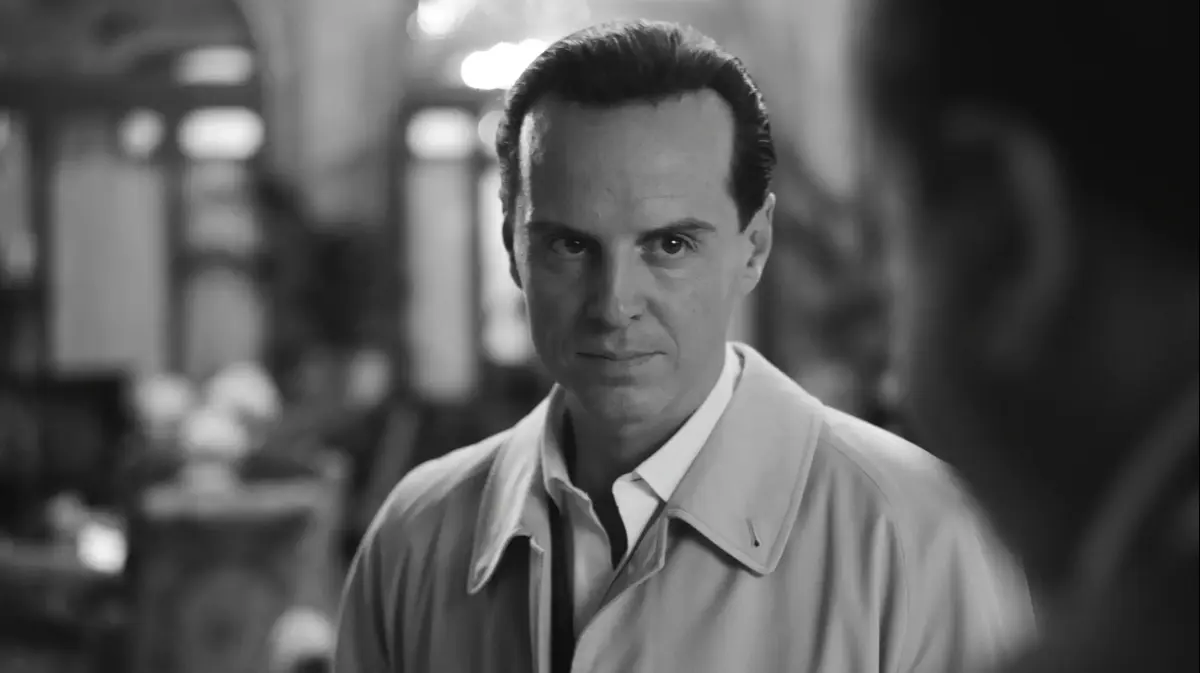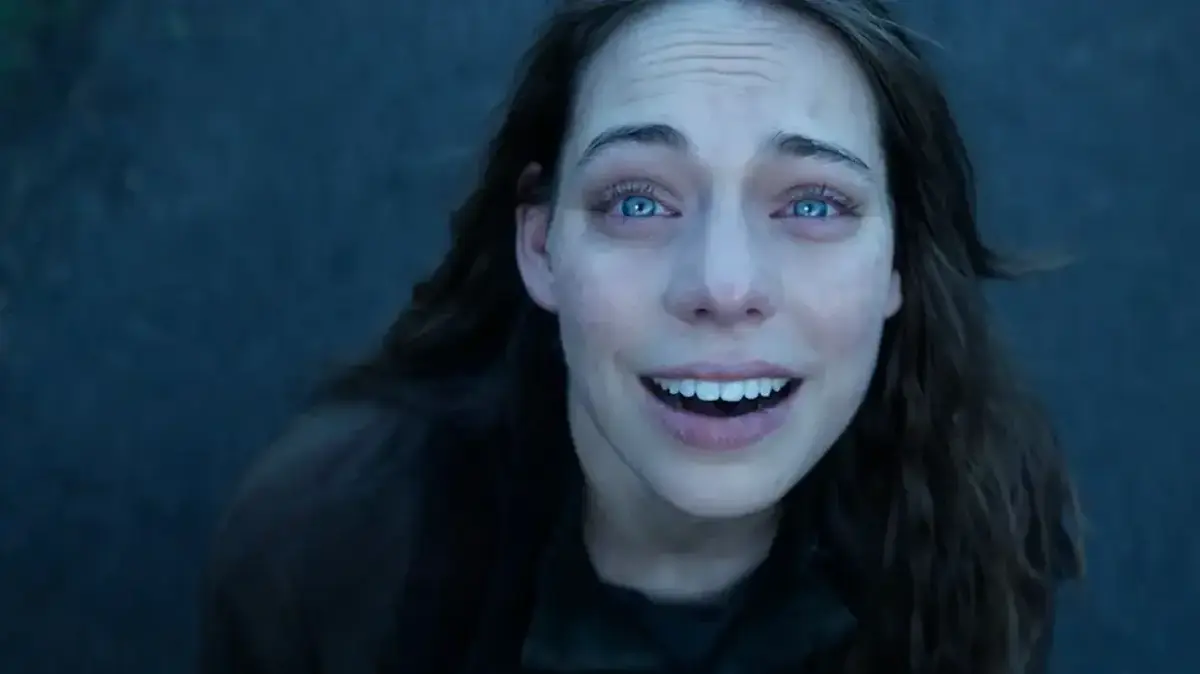culture
TV
TV review
This is Netflix's most heartwarming series.
This is the most hypocritical series on Netflix
The heart rejoices as it watches "The Dog's Buried Mouth," the new docu-reality series that accompanies "The Star Trainer of the Stars."
This is not a series about dogs, but about unconditional love.
And it's exciting.
Until one realizes that behind all this photogenic love there is a lot of bullshit.
One day Netflix will be ashamed that they took part in it
Tags
Netflix
Seal
Walla!
culture
Wednesday, 03 March 2021, 00:38
Share on Facebook
Share on WhatsApp
Share on general
Share on general
Share on Twitter
Share on Email
0 comments
The Falcon and the Winter Soldier, The Falcon and The Winter ...
Said Moulay Iranian Judoka says thank you in Hebrew
From the movie "I Care"
The sounds of metal
Stand-up comedian Nadav Abaxis performing at the Heichal Hatarbut in Afula ...
Allen vs. Farrow
Uri Gabriel and Zion Baruch in an excerpt from the "Photographed" series of ...
Behind her eyes, Yves Jason
Aviv Geffen performing at Zappa Herzliya with the opening of the culture ...
Facing a trivia game causes chaos in the studio
Trailer for the series "Here the dog is buried" (Netflix)
In the end, it's all a matter of love.
The reality series "Here the Dog Is Buried" (another terrible translation from the Hebrew Netflix house, this time for Canine Intervention) supposedly features a thousand charismatic dog dogs that help "problematic" dog owners behave properly and thus save them.
But in fact, the series is about people who refuse to give up their love.
The series ends with the words of Diana, a woman who comes to adopt a small Chihuahua dog.
Diana holds the puppy Dream in her arms and says, "As humans, we always talk about love, and how it comes unconditionally. We do not know at all what that means, but they do know. There is nothing like the love of a dog."
She's not wrong.
Anyone who has ever loved or is loved by a dog knows this.
In other words, this is not a series about dogs undergoing a training workshop by humans, but about the great love between dogs and humans, one that will withstand all difficulties, including a photogenic training workshop.
And the heart is happy as it watches this show.
Endorphins are released in the body.
TV rarely does that, dogs do it all the time.
The average viewer looks at these wondrous creatures who put a smile on the face of their best friends, and is filled with happiness for himself.
The combination of proper editing, good story building and a collection of photogenic dogs makes the series one big happiness.
But like many times in such docu-reality series, the pieces left on the floor of the editing room can paint a completely different story, much less happy.
More on Walla!
Like her music, the film about Billy Aylish also turns out to be something completely different
To the full article
Loves dogs, and also makes them great business.
Jazz LeBart and the Dog Dream (Photo: Netflix)
The series follows Jas LeBert, a dog trainer from Auckland, California, who runs the "Kelly K9" training center.
Jas responds to calls from desperate dog owners, who keep dogs with severe behavioral problems, and helps them get the dog back on track, thus saving the dogs ’lives, and also improving the owner’s quality of life.
So far, so good.
If this premise is familiar to you, then it's because it's exactly the same idea as Caesar Milan's 'Whisperer for Dogs'.
As with Caesar, here too Jass' personality takes on a significant role.
Jass, an African-American Muslim, tells during the series about his childhood on the hard streets of Auckland, where it is said that if you are black you can end up in jail or with a bullet in the head.
He managed to escape this fate thanks to the world of dogs that was revealed to him as a child.
Today he is the "trainer of the stars", and his name is known in Hollywood as someone to turn to before wanting to bring a friend on all fours home.
This is also where the problematic nature of the series comes in, which has led to almost 40,000 people already signing a petition to cancel it.
Jass' technique is based on the "classical training" method, but many behavioral experts nowadays call it "anachronistic training".
The method, developed for training attack dogs in World War I, is based on corrections and positive punishment, using the stick and carrot method.
Whenever the dog does something he is not supposed to do, he gets an unpleasant punishment.
It is a technique based on strength and fear, and it can in many cases aggravate anxiety and aggression in the dog, as well as physical damage from the means of punishment.
The world really needed another Caesar Milan?
(Photo: AP)
As early as the 1960s and 1970s, studies have shown that taking a positive attitude toward dogs by reinforcing good behavior (rather than punishing bad behavior) yields much better results, creating a better relationship between the dog and its owner in the long run.
This is also the reason why, unlike Jass Lebert, many thousands today advocate a positive attitude, one that emphasizes the welfare of the dog.
The problem is that positive attitude training is one of the most non-televised things there is, while the classic method yields action, barking, biting, and testosterone-filled speeches about alpha males and hierarchical society in bands, which is based on long-refuted science.
But you don't have to be a canine behavior expert to understand the problematic nature of a series.
Already in the first episode of the series we meet a nice man who adopted Lady Macbeth, a stunning pit bull bitch with a tragic background story.
She lived on the street with a homeless man, got into a gunfight, injured her bullet in the leg and had her leg amputated.
As a result, naturally, she became anxious and aggressive towards strangers, and even attacked her father’s friends for her effort when they visited her home.
This story is told to us while the dog looks remarkably relaxed while a camera crew penetrates into her home and photographs her and her father, without us seeing any sign of aggression on her part.
The first time the lady becomes violent comes when Jess herself arrives at the house, and begins to test her patience, while aggressively penetrating her private space.
All in all, she does not want them to infiltrate her private space.
Lady Macbeth in "Here the Dog Is Buried" (Photo: Screenshot, Netflix)
This is not a spoiled dog, if there is such a thing at all.
This is a sensitive bitch, which should be treated accordingly.
If friends come to you for two hours to watch a game on TV, you should close it in one of the rooms or tie it with a strap.
On the street you should walk with her with a checkpoint here, and ask people not to pet her.
Unpleasant, but neither is the end of the world.
Instead, Jass suggests forcing her to deal with her anxieties by flooding stimuli and elements that make her aggressive, in addition to incorporating a stranglehold into her education.
That is, whenever this sensitive bitch expresses her anxiety from strangers, she should be punished.
At this point he takes the bitch for two weeks to his training center, just like a broken vehicle sent to the garage.
Jass uses terminology like de-sensitization (while actually producing flooding), talking about emotions (while ignoring their existence) and then the camera turns off, and we find Lady Macbeth two weeks later, when she is supposedly more educated and calm, but we have no real idea what happened In those two weeks or so her new temperament will last with her loving owner, without the shadow of the dominant trainer.
Training pensions are a very lucrative business, which also exists in Israel, but its effectiveness is questionable.
For Netflix, of course, it does not bother, but on the contrary - it is a great TV.
The "bad" bitch disappeared and was replaced by a "good" bitch.
happy ending.
Now imagine another docu-reality that uses the same method: Super Nanny arrives at a house where there is a child who reacts violently to human contact.
Whenever someone tries to touch him, he responds with curses and physical violence.
Obviously the child suffers from a deep social problem that needs to be examined gently and sensitively, but it's a bit boring, so to solve the child's problem of violence, writer Nanny offers to take him from his parents' reinforcement to a re-education camp.
After two weeks, the child returns completely different.
Thcls?
This is a series that would surely reach the top 10 on Netflix.
A visit to Kelly K9's website reveals the insane amounts Jass makes from dog training.
To get into his cheapest training program you will have to part with $ 500 for an online seminar.
That means Jas will not even meet your dog.
For eight group sessions you will already have to spend $ 1,500.
If you want more discipline instilled in your best friend, then there is the option of a 90-day course in boarding school conditions that will cost "only" $ 8,997 - that is, about NIS 30,000.
By the way, thanks to Netflix all the dates for the next courses have already been sold out, and the company has temporarily stopped its message center due to an excess of inquiries.
And yet, their website boasts that each of the tracks receives as a gift an electronic collar, the kind that electrifies the dog every time he does something wrong.
Because as Jass says right at the opening of the first episode, dogs are sensitive.
Behind the discussion of the various training methods are ultimately helpless creatures whose lives often depend on humans.
This is an important discussion that needs to be held with an open mind.
Is it worth absorbing aggressive training methods to quickly return to the beneficiary "spoiled" dogs when the alternative is dead or a whole life in a cage?
This is a complex question that the series does not try to answer, but simply presents Jass as a kind of saint who saves lives.
It's hard to believe that even he believes in it.
For example, in the sixth and final episode of the season, Jass arrives at an abandoned dog shelter in the heart of the Mohabite desert.
A good woman named Janet collapses because she takes under her care every street dog that is brought to her, many of them suffer from behavioral problems and are therefore not candidates for adoption.
Jass comes to her aid, "fixes" four of her broken dogs and finds them good homes.
All is well that ends well.
But it's hard to ignore the fact that Jass himself owns purebred dogs, which he breeds at his training institute for assault purposes.
These dogs are turned by Jass into a product for everything, and they come with an expensive price tag ranging from $ 30-50,000, depending on their “model”.
These are fighting machines for everything, which in the wrong hands can be fatal.
The series argues that dogs should be maintained four times a year in refresher workshops.
Kind of a 10,000 treatment to not cause the dog you bought to keep you home to actually attack your children, for example.
Jazz with the dog Nino, which he sold to boxer Andre Barto (Photo: Netflix)
In one of the moments that are supposed to excite the viewers in the series, Jass recounts how during a vacation in Casablanca he met his wife, a resident of Morocco, and decided that she must be his.
It is a speech of the kind that once sounded romantic, and nowadays mostly testifies to the style of the speaker, who sees himself as an "alpha male" in a pack of wolves that exists only in his head.
We see Jass and his wife hugging in the maternity ward holding their eldest son.
As a gift, he gives the soft baby a sweet puppy, the son of his purebred attack dog.
The fact that the series shows on the one hand the suffering life of the dogs in the pens, and on the other hand shows us how the same person who cares so much about the "harmony of dogs with humans" breeds purebred dogs, without even a drop of self-observation, makes the series hypocritical on an almost satanic level .
More than 6 million animals enter kennels across the U.S. each year. Of those, an average of 1.5 million dogs are killed each year. It is estimated that there are tens of millions more dogs living on the streets in the U.S., many of which freeze to death in the winter.
In this reality, it is hard to look at someone who breeds dogs for financial gain, and believe him that he says he loves dogs.
It is conceivable that in the not too distant future people will look at breeding purebred dogs for profit as we look today at 19th century slave owners.
Netflix has decided to take the wrong side of history this time.
One day she will download this series from her catalog, and be ashamed.
Share on Facebook
Share on WhatsApp
Share on general
Share on general
Share on Twitter
Share on Email
0 comments















